To view a PDF of slides presented during PRRI’s February 4, 2025, webinar on this report, please click here. For a replay of the PRRI webinar via YouTube, please click here.
Executive Summary
In 2024, PRRI released a groundbreaking national survey that provided for the first time the ability to estimate support for Christian nationalism in all 50 states. Building on that work throughout 2024, PRRI interviewed more than 22,000 adults as part of the PRRI American Values Atlas to continue monitoring the spread of support for Christian nationalism and the factors driving such views.
Three in ten Americans continue to qualify as Christian nationalism Adherents or Sympathizers.
- In 2024, three in ten Americans qualified as Christian nationalism Adherents (10%) or Sympathizers (20%), compared with two-thirds who qualified as Skeptics (37%) or Rejecters (29%).
- These percentages have remained stable since PRRI first asked these questions in late 2022.
Partisanship, media habits, age, and education levels are all linked to Christian nationalism support.
- A majority of Republicans qualify as either Christian nationalism Adherents (20%) or Sympathizers (33%), compared with about two in ten or fewer independents (6% Adherents and 16% Sympathizers) and Democrats (5% Adherents and 11% Sympathizers).
- Two-thirds of Americans who most trust most far-right TV news sources qualify as Christian nationalism Adherents (26%) or Sympathizers (40%), as does a majority of those who most trust Fox News (18% Adherents and 34% Sympathizers).
- Support for Christian nationalism is positively associated with lower education levels and higher age.
White evangelical Protestants and Hispanic Protestants are most likely to hold Christian nationalist beliefs; church attendance is also strongly correlated with Christian nationalist views.
- Around half of those who attend religious services weekly or more qualify as Christian nationalism Adherents or Sympathizers (51%), compared with 39% of those who attend at least a few times a year and 18% of those who seldom or never attend services.
- A majority of white Americans who attend religious services weekly (54%) qualify as Christian nationalism Adherents or Sympathizers, compared with 46% of Black Americans and 47% of Hispanic Americans.
Christian nationalist views predominate in the South and Midwest; there is also a strong correlation between support for Christian nationalism and vote for President Donald Trump in all 50 states.
- The states with the highest levels of support for Christian nationalism — which includes about half of their residents — are Mississippi (51%), Oklahoma (51%), Louisiana (50%), Arkansas (49%), West Virginia (48%), and North Dakota (46%).
- Two states emerge with more than half of their white, non-Hispanic residents supporting Christian nationalism: Louisiana (56%) and Mississippi (53%).
- The higher state residents scored on the Christian nationalism scale, the more likely they were to support Trump in the 2024 presidential election.
Christian nationalists hold distinct views on the outcome of the 2024 presidential race and the current state of our democracy as we head into a second Trump administration.
- Two-thirds of Christian nationalism Adherents (67%) and nearly half of Sympathizers (48%) agree that God ordained Trump to be the winner of the presidential election, compared with just 20% of Skeptics and 4% of Rejecters.
- While just one-third of Americans (33%) are very confident that democracy will remain strong over the next four years, 64% of Christian nationalism Adherents and 50% of Christian nationalism Sympathizers are very confident.
- Christian nationalism Adherents and Sympathizers are more confident that Trump will peacefully leave office at the end of his upcoming term and that Americans will be able to freely express their political views, even if they differ from the incoming presidential administration. They are also less likely to think that Trump will punish his enemies with the power of the federal government.
Christian nationalists also hold more extreme views about immigrants and are more likely to subscribe to patriarchal beliefs.
- Strong majorities of Christian nationalism Adherents (68%) and Sympathizers (62%) believe that immigrants are invading our country and replacing our cultural and ethnic background, compared with 34% of Skeptics and 9% of Rejecters.
- Christian nationalism Adherents (69%) and Sympathizers (58%) are significantly more likely than Skeptics (34%) and Rejecters (12%) to agree that immigrants entering the country illegally today are poisoning the blood of our country.
- More than seven in ten Christian nationalism Adherents (72%) and 63% of Sympathizers agree that society as a whole has become too soft and feminine, compared with 46% of Skeptics and 18% of Rejecters.
- While about one-third of Americans (35%) agree with the statement “Society is better off when men and women stick to the jobs and tasks they are naturally suited for,” majorities of both Christian nationalism Adherents (61%) and Sympathizers (54%) agree.
Christian nationalists are more likely than other Americans to support political violence and subscribe to QAnon views.
- Nearly four in ten Christian nationalism Adherents (38%) and three in ten Sympathizers (30%) agree that “because things have gotten so far off track, true American patriots may have to resort to violence to save the country,” compared with only 15% of Skeptics and 7% of Rejecters.
- Half of Christian nationalist Adherents (50%) and one-third of Sympathizers (32%) endorse QAnon beliefs, compared with 19% of Americans nationally.
Introduction
Last year, PRRI released a major national survey that provided for the first time the ability to estimate support for Christian nationalism in all 50 states. Building on that work, PRRI interviewed more than 22,000 adults throughout 2024 as part of its American Values Atlas. This updated report highlights the prevalence of Christian nationalism across the United States and considers the relationship between President Donald Trump’s performance in each state and Christian nationalist views. This survey report also explores the intersection of Christian nationalism with Americans’ attitudes about confidence in U.S. elections, the future of democracy, and support for Trump. Finally, the report considers how Christian nationalism is linked to Americans’ attitudes toward immigration, patriarchy, and QAnon beliefs.
Measuring Christian Nationalism
To measure Christian nationalism, PRRI used a battery of five questions about the relationship between Christianity, American identity, and the U.S. government.[1] In 2024, about 10% of Americans qualified as Christian nationalism Adherents, 20% as Sympathizers, 37% as Skeptics, and 29% as Rejecters.
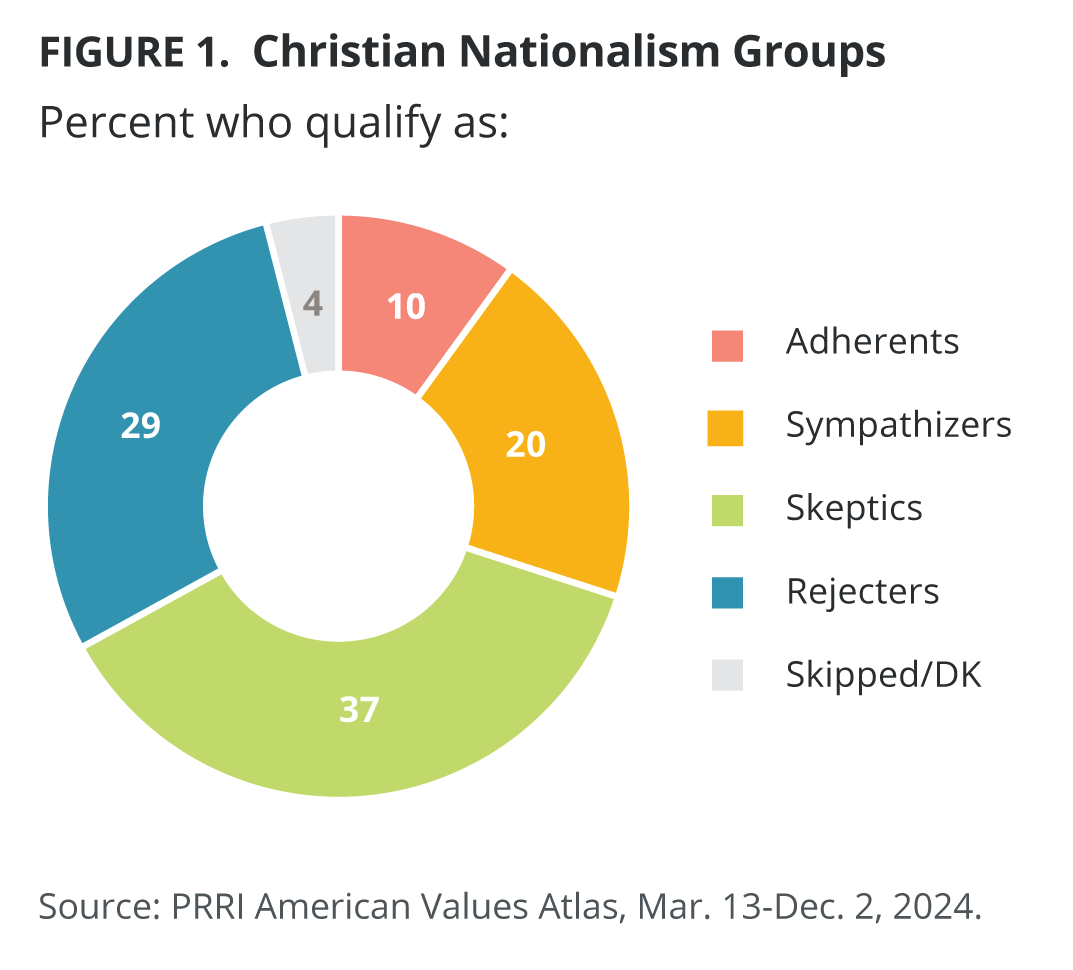
As the chart below demonstrates, Americans are no more likely to embrace Christian nationalist views today than they were in late 2022, as attitudes about Christian nationalism have remained largely stable during the past few years.
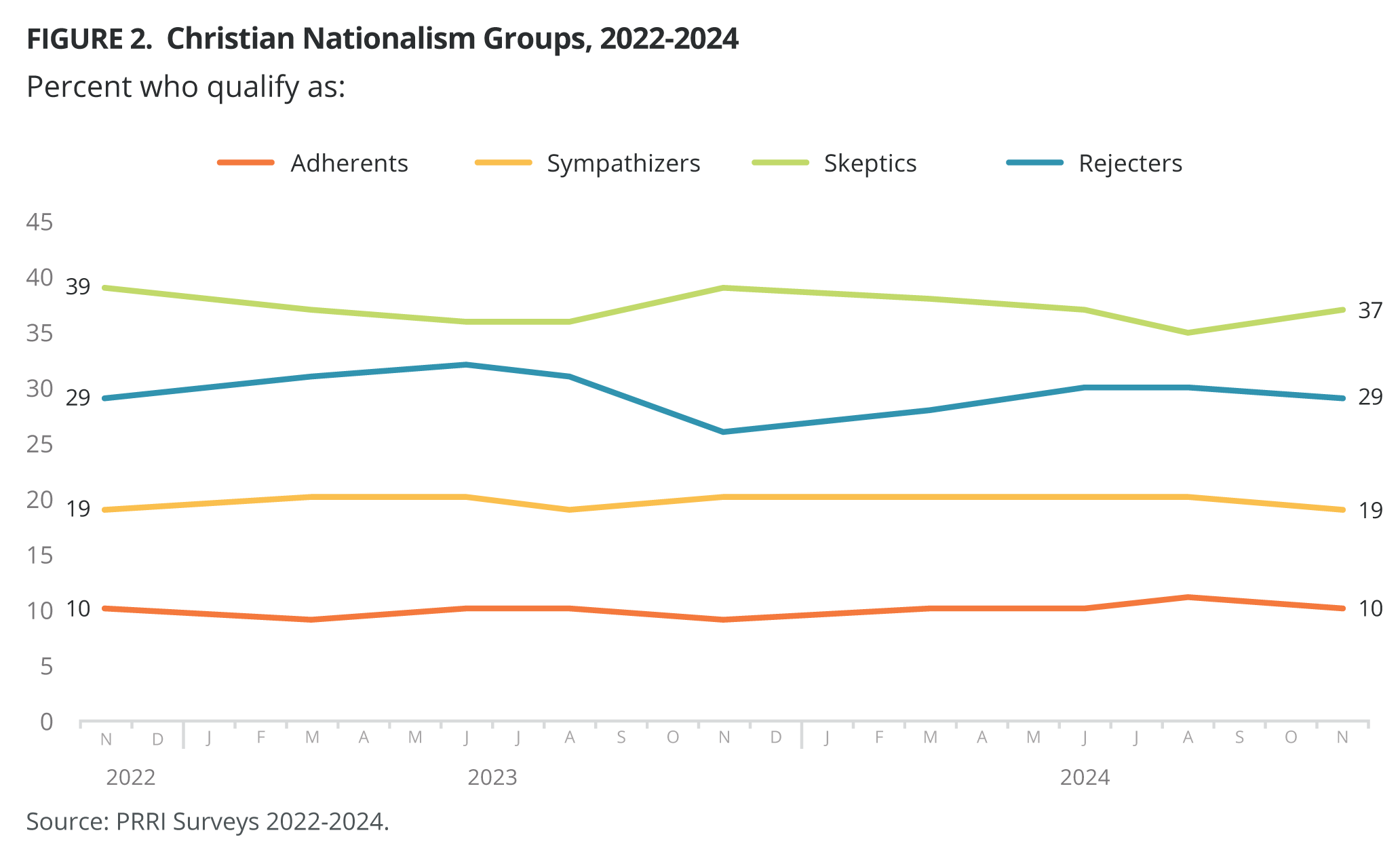
Who Is Most Likely to Adhere to Christian Nationalist Ideology?
Partisanship and Media Consumption
PRRI’s 2024 PRRIAmerican Values Atlas reveals that partisanship and media consumption are closely linked to Christian nationalist views. Figure 3 shows that a majority of Republicans qualify as either Christian nationalism Adherents (20%) or Sympathizers (33%), compared with about two in ten or fewer independents (6% Adherents and 16% Sympathizers) and Democrats (5% Adherents and 11% Sympathizers).
In addition, two-thirds of Americans who most trust most far-right TV news sources, such as One America News Network and Newsmax, qualify as Christian nationalism Adherents (26%) or Sympathizers (40%). Similarly, a slim majority of those who most trust Fox News qualify as Christian nationalism Adherents (18%) or Sympathizers (34%). This is in stark contrast to just one in four of those who do not watch TV news (10% Adherents and 18% Sympathizers) or most trust mainstream TV news (9% Adherents and 18% Sympathizers), such as broadcast news networks including ABC, NBC, or CBS.
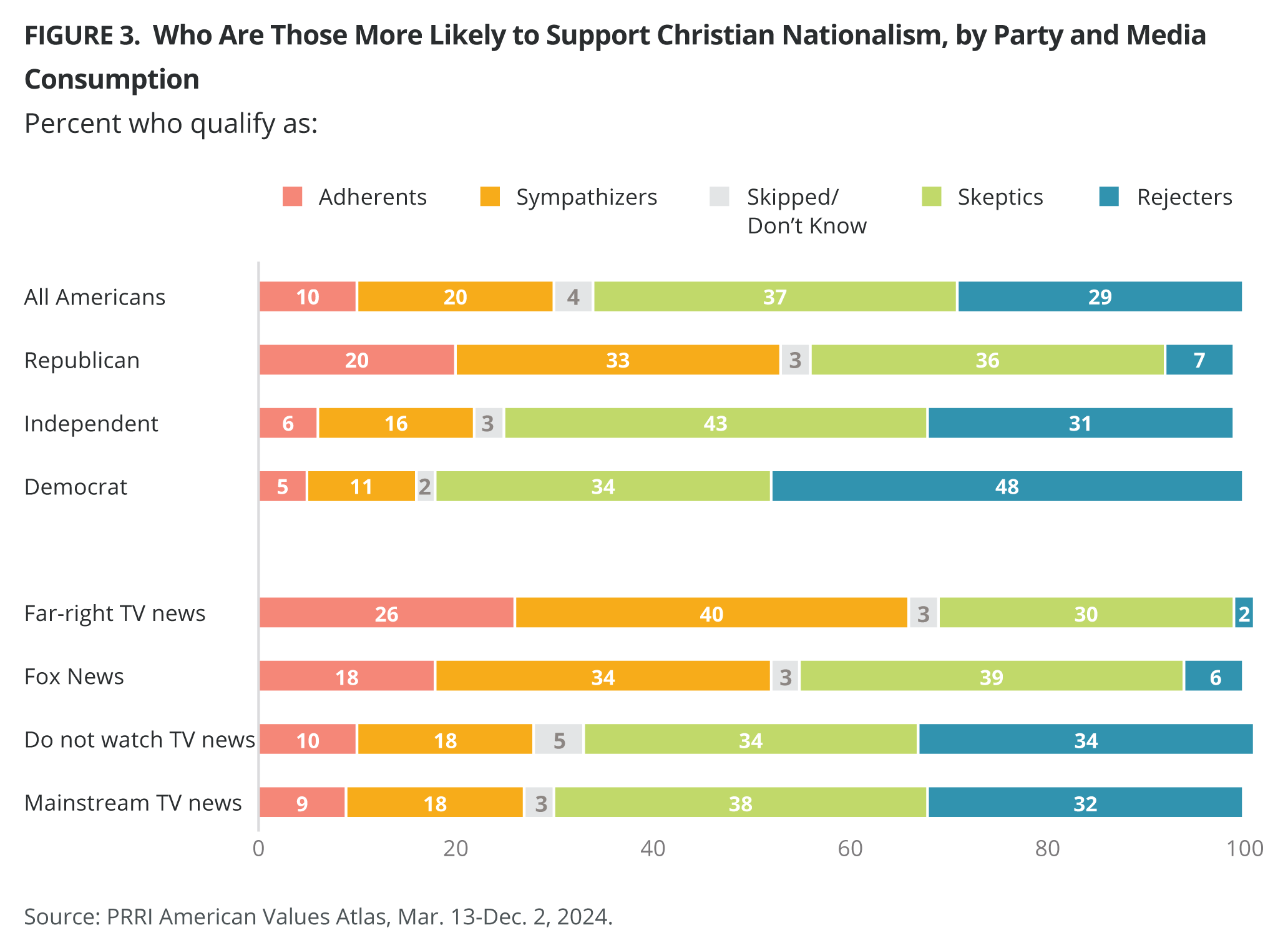
Education, Age, and Race
PRRI’s 2024 American Values Atlas also reveals that education and age are related to Christian nationalism. Generally speaking, support for Christian nationalism is positively associated with lower education levels and higher age.
Among racial groups, there is lower support for Christian nationalism among AAPI Americans, who are less likely than the general population to identify as Christian, but fewer differences among other racial and ethnic groups. However, previous analysis by PRRI finds that while there is little variation by race or ethnicity when it comes to support for Christian nationalist identity, Christian nationalist beliefs, as refracted through racial and ethnic identity, produces divergent political outcomes among white, Hispanic, and Black Americans.[2]
For instance, our previous analysis finds that among white Americans and Hispanic Americans — but not Black Americans — holding Christian nationalist beliefs is strongly correlated with Republican Party identity and support for Trump. White Christian nationalists are also far more likely than Hispanic and Black Christian nationalists to prioritize the issues of immigration and access to guns when they think about supporting a political candidate.
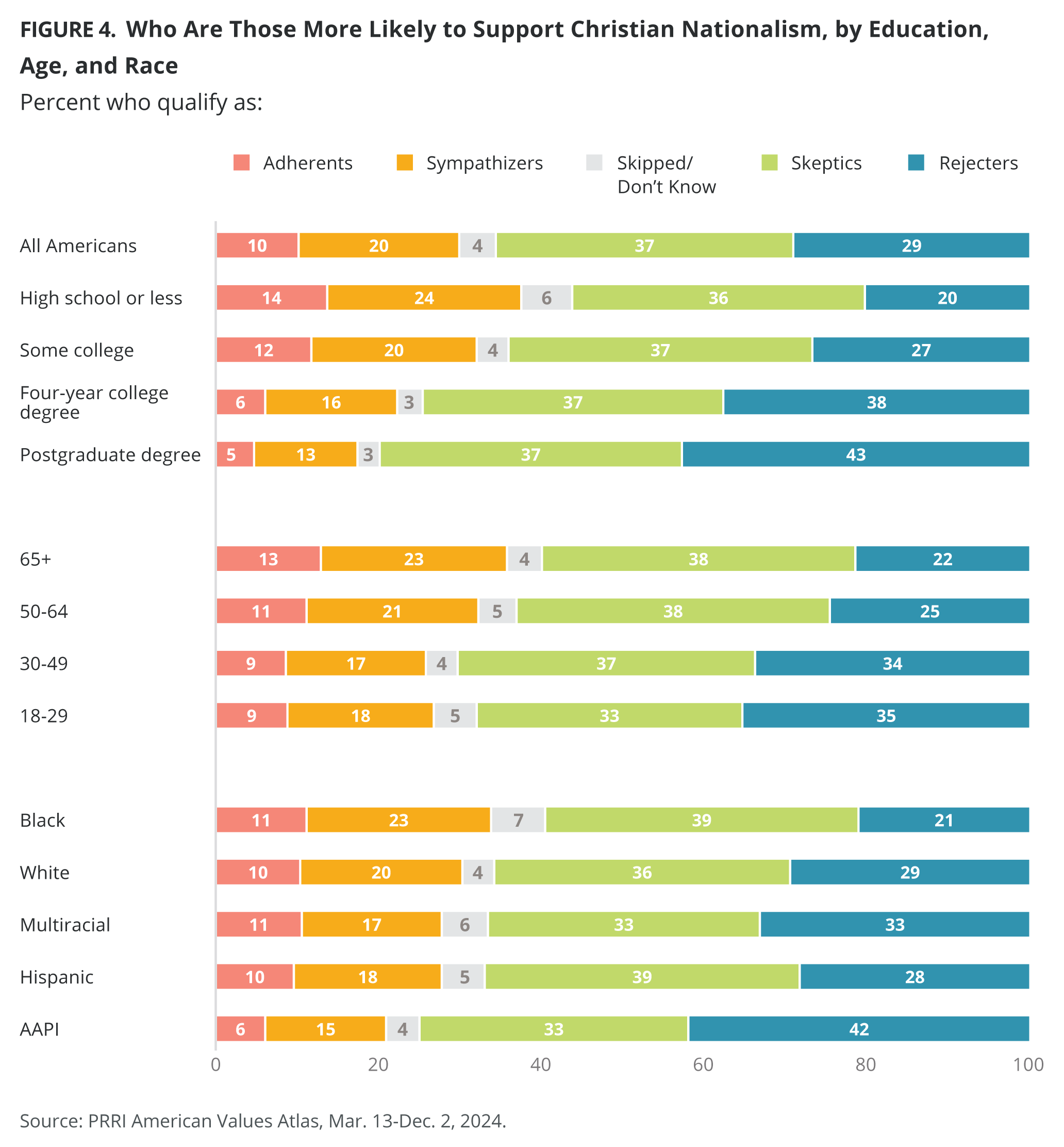
Religious Affiliation
Roughly two-thirds of white evangelical Protestants (30% Adherents and 35% Sympathizers) and a majority of Hispanic Protestants (26% Adherents and 31% Sympathizers) qualify as Christian nationalists. About four in ten Latter-day Saints (12% Adherents and 25% Sympathizers) and Black Protestants (17% Adherents and 27% Sympathizers) also qualify as Christian nationalist supporters.
By contrast, the appeal of Christian nationalist ideology is significantly lower among other religious groups, including white Catholics (8% Adherents and 23% Sympathizers), Hispanic Catholics (7% Adherents and 19% Sympathizers), white mainline/non-evangelical Protestants (7% Adherents and 23% Sympathizers), and Jehovah’s Witnesses (3% Adherents and 15% Sympathizers). Only about one in ten members of other non-Christian religions, including Jewish Americans (3% Adherents and 9% Sympathizers), Buddhist Americans (2% Adherents and 10% Sympathizers), Muslim Americans (1% Adherents and 7% Sympathizers), Hindu Americans (<1% Adherents and 12% Sympathizers), Unitarian Universalists (<1% Adherents and 5% Sympathizers), and the religiously unaffiliated (2% Adherents and 8% Sympathizers), support Christian nationalism.
Levels of support for Christian nationalism have remained stable over the last year among almost all religious groups. Among Hispanic Protestants, however, support for Christian nationalism has grown 14 percentage points to 57% (26% Adherents and 31% Sympathizers), up from 43% (20% Adherents and 23% Sympathizers) when PRRI first asked these questions in late 2022.
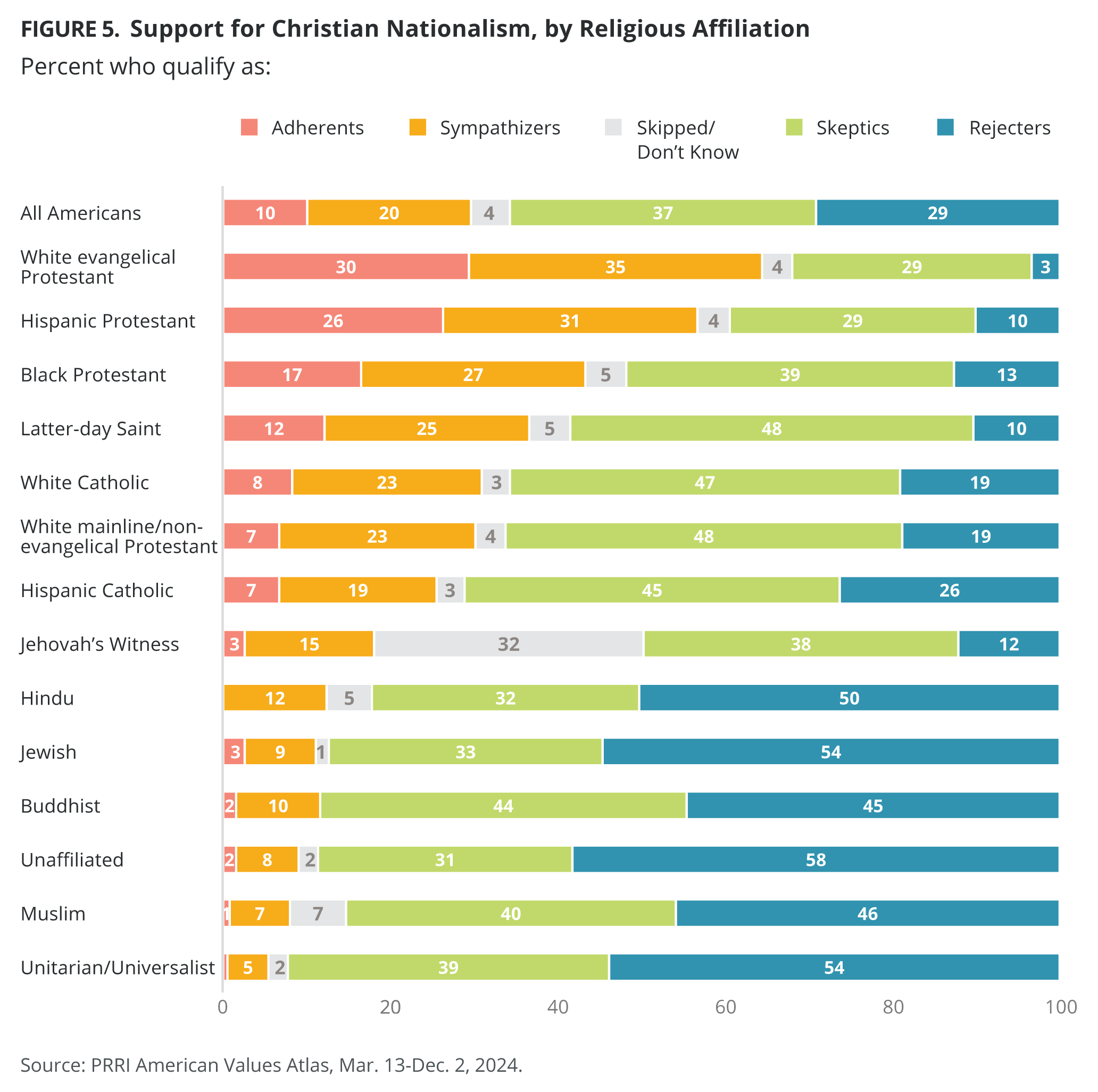
Religious Attendance by Race
Christian nationalist views are more prevalent among Americans who attend religious services frequently. Specifically, over half of those who attend religious services weekly or more qualify as Christian nationalism Adherents or Sympathizers (51%), compared with 39% of those who attend at least a few times a year and 18% of those who seldom or never attend services.
When considering the relationship between religious service attendance and Christian nationalism among different racial and ethnic groups, a majority of white Americans who attend religious services weekly (54%) qualify as Christian nationalism Adherents or Sympathizers. Fewer Black and Hispanic Americans who attend services at least once a week, however, qualify as Christian nationalism Adherents or Sympathizers (46% and 47%, respectively).
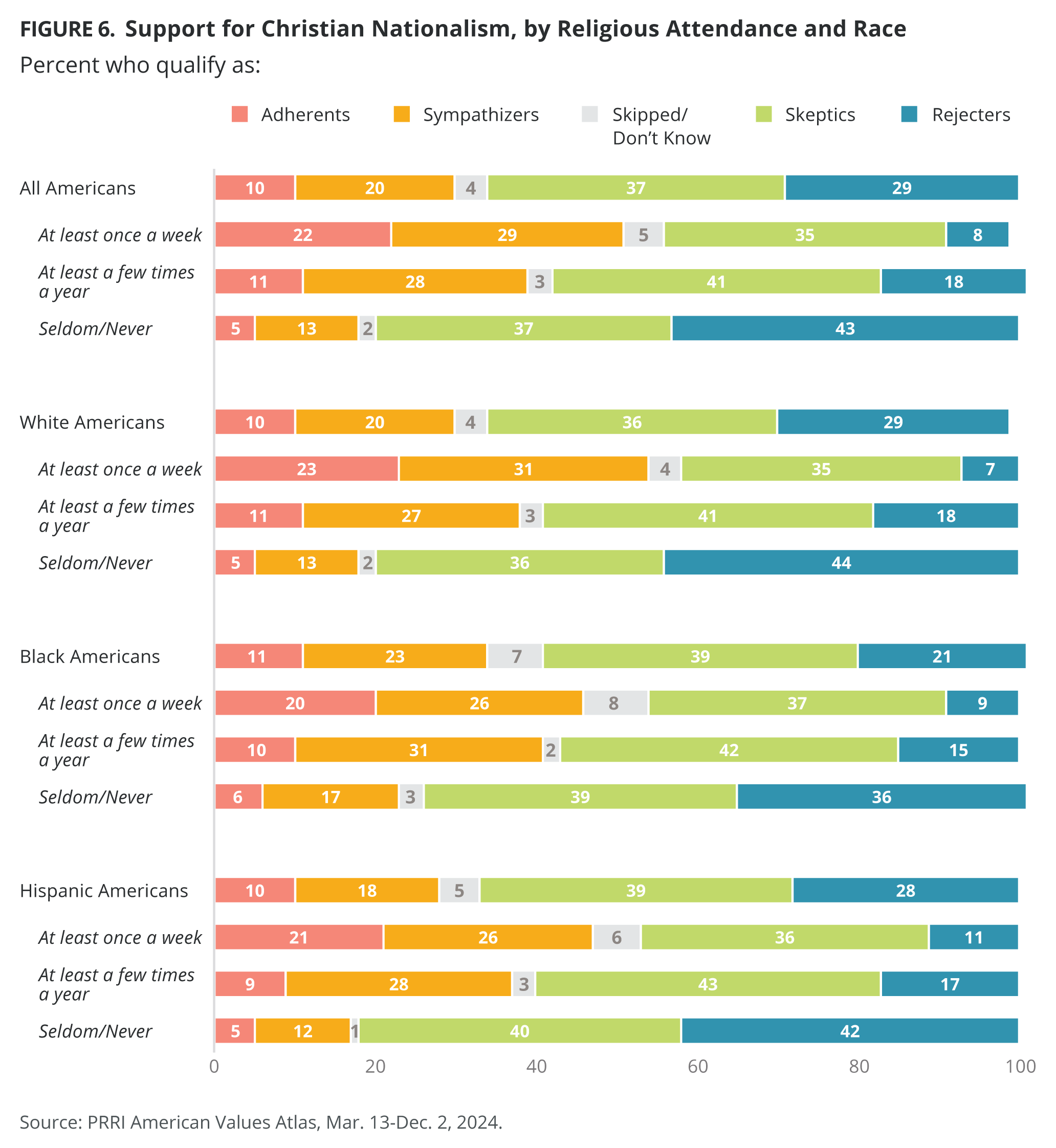
Christian Nationalism at the State Level
Support for Christian Nationalism Across All 50 States
The proportion of Americans who support Christian nationalist ideology, defined in this report as Christian nationalism Adherents and Sympathizers, differs considerably across states, ranging from a low of 15% to a high of 51% (see Appendix A for a table of Christian nationalism groups in all 50 states).
The states with the highest levels of support for Christian nationalism, which includes about half of their residents, are Mississippi (51%), Oklahoma (51%), Louisiana (50%), Arkansas (49%), West Virginia (48%), and North Dakota (46%). At the other end of the spectrum, there are five states in which less than two in ten residents hold Christian nationalist views: New Jersey (19%), Vermont (19%), Rhode Island (17%), Washington (16%), and Massachusetts (15%). The only state that registers a statistically significant increase in support for Christian nationalism is Maryland, from 19% in 2023 to 30% in 2024.
Two states emerge with more than half of their white, non-Hispanic residents supporting Christian nationalism: Louisiana (56%) and Mississippi (53%). Nearly half of white residents in Arkansas (48%), Oklahoma (48%), North Dakota (47%), West Virginia (47%), and Wyoming (46%) also qualify as Christian nationalism Adherents or Sympathizers.
Christian Nationalism and Support for Trump by State in 2024
The 50-state heat map shows that Christian nationalist views predominate in the South and Midwest — states that largely voted for Trump in the 2024 presidential election.
Figure 9 shows the strong positive correlation between presidential vote choice in the 2024 election and support for Christian nationalism (the state’s average raw score on the Christian nationalism scale). The upward sloping trend line through the distribution demonstrates that, overall, the higher state residents scored on the Christian nationalism scale, the more likely they were to support Trump.
For example, Mississippi has an average score of 0.50 on the Christian nationalism scale, with 60.9% of its voters casting their ballots for Trump in the 2024 election. Similarly, Louisiana, Oklahoma, and West Virginia have comparable average scores on the Christian nationalism scale (0.50, 0.49, and 0.48, respectively), with 60.2%, 66.2%, and 70% of voters in those states supporting Trump. In contrast, states with lower average Christian nationalism scores show significantly less support for Trump. Massachusetts, with an average score of 0.20, saw only 36.2% of its voters backing Trump. However, Washington and Vermont, with average scores of 0.21 and 0.23, respectively, on the Christian nationalism scale, recorded 39.3% and 32.6% Trump support, respectively. Washington, D.C. stands out as an outlier, with an average Christian nationalism score of 0.25 but only 6.6% of its residents voting for Trump in 2024.[3]
Christian Nationalism and Confidence in the Federal Government and Elections
As the charts above demonstrate, Christian nationalism supporters are strongly supportive of Trump and have largely followed his lead in their attitudes about the legitimacy of elections, which are contingent not on procedural facts but on the success of their favored candidate.
Pre-Election
In September 2024, looking back on Trump’s electoral loss in 2020, three in ten Americans (31%) agreed that “the 2020 election was stolen from Donald Trump.” Most Christian nationalism Adherents (69%) and Sympathizers (51%) agreed, compared with 27% of Skeptics and just 8% of Rejecters. In contrast, nearly all Christian nationalism Rejecters (90%) disagreed with idea that the 2020 election was stolen.
Post-Election
PRRI’s 2024 post-election survey shows that around half of Americans (48%) are very confident the election was conducted fairly and accurately, followed by 36% who are somewhat confident, and 14% who are not at all confident. Given Trump’s victory, not surprisingly, a majority of Christian nationalism Adherents (58%) are very confident that the election was conducted fairly and accurately, a rate significantly higher than Sympathizers (47%), Skeptics (49%), and Rejecters (45%).
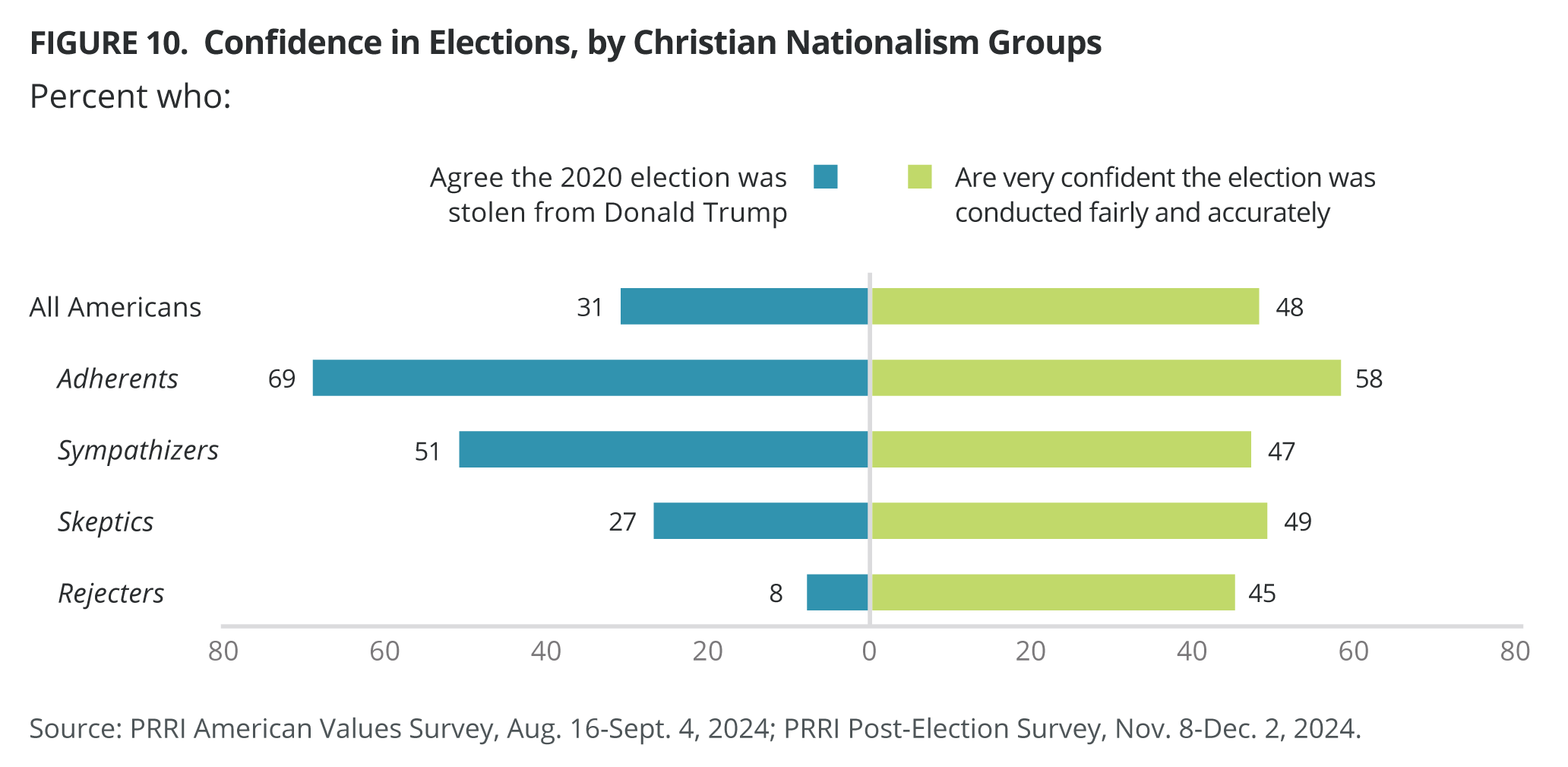
God Ordained Trump as the Winner of the Election
Christian nationalism has been closely linked to support for Trump, as many of its adherents view him as a leader who champions their vision of America as a Christian nation. PRRI’s 2024 post-election survey asked if Americans agree with the idea that “God ordained Donald Trump to be the winner of the 2024 election.” While only one-quarter of Americans agree with this statement, two-thirds of Christian nationalism Adherents (67%) and nearly half of Sympathizers (48%) agree that God ordained Trump to be the winner of the presidential election, compared with just 20% of Skeptics and 4% of Rejecters.
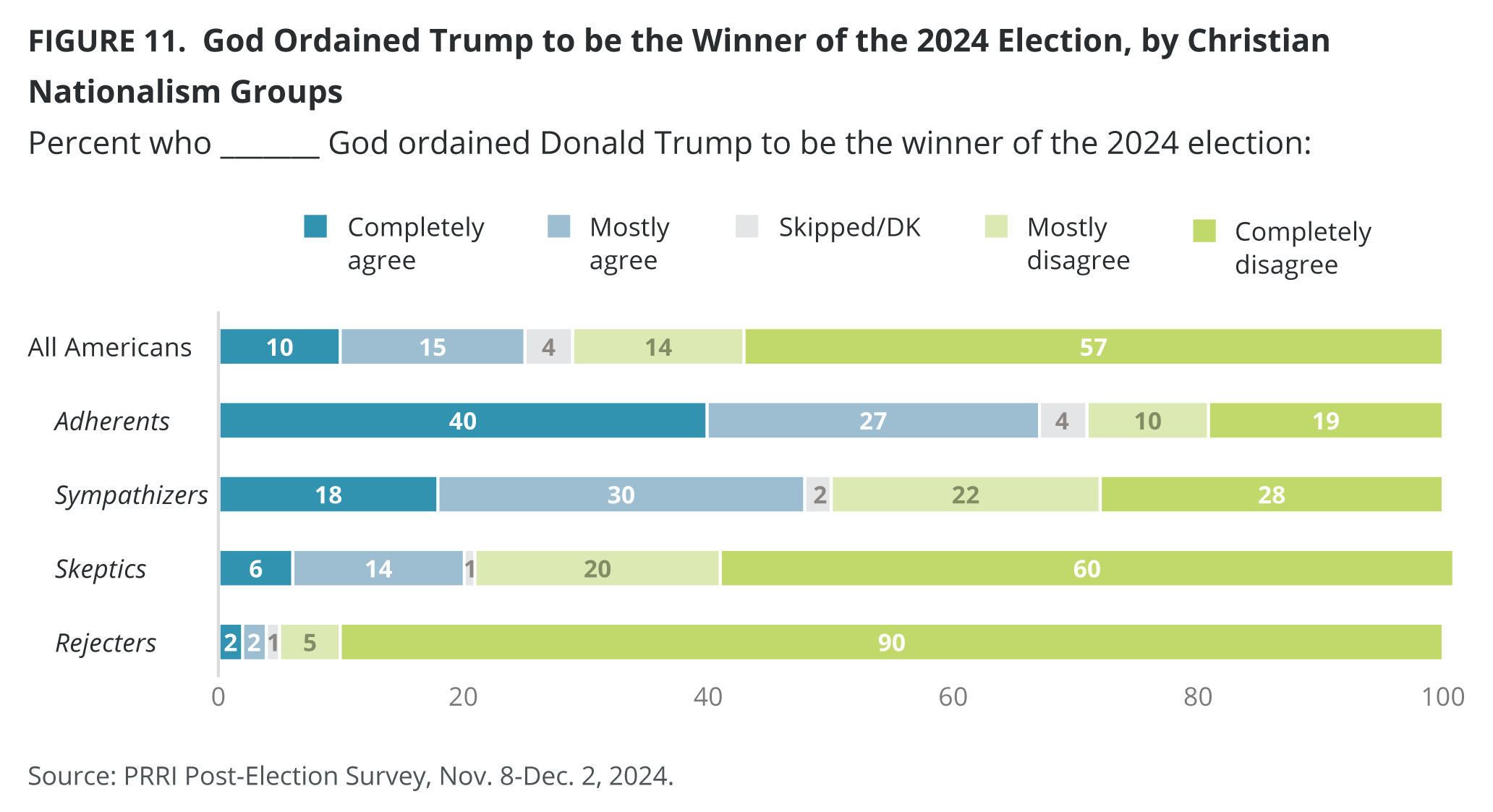
Christian Nationalism and Views about the Future of Democracy after Trump’s Victory
Christian nationalism is also closely tied to divergent views about the future of democracy, as its adherents often prioritize maintaining a cultural and religious identity over democratic and religious pluralism. As a result, Christian nationalists may view democratic processes as secondary to preserving their vision of America as a Christian nation, with some even endorsing authoritarian measures to achieve their goals, as our report on the connection between authoritarianism and Christian nationalism reveals. Yet, their support for broad democratic positions is contingent on whether their preferred candidate or party has been successful in recent elections.
Democracy Will Remain Strong Over the Next Four Years
One-third of Americans (33%) are very confident that democracy will remain strong over the next four years, while 29% are somewhat confident, and 36% are not at all confident. Yet, Christian nationalism Adherents (64%) are very confident that democracy will remain strong, as are half of Sympathizers (50%). Christian nationalism Skeptics (34%) and Rejecters (12%) are less likely to be very confident about the strength of democracy in the next Trump term.
Trump Will Leave Peacefully After His Term
Only about one-third of Americans (35%) are very confident that Donald Trump will peacefully leave office at the end of his term; around one-quarter of Americans (24%) are somewhat confident and nearly four in ten (39%) are not at all confident that he will leave peacefully. Christian nationalism Adherents (63%) and Sympathizers (49%) are significantly more likely than Skeptics (38%) and Rejecters (13%) to be very confident that Trump will peacefully leave the White House at the end of his term.
Americans Can Freely Express Their Views
More than one-third of Americans are very confident that Americans will be able to freely express their political views, even if they differ from the incoming presidential administration, compared with two-thirds who are either somewhat (32%) or not at all confident (31%). Christian nationalism Adherents (59%) and Sympathizers (48%) are significantly more likely than Skeptics (36%) and Rejecters (18%) to be very confident that Americans will be able to freely express their views.
Trump Will Use the Government to Punish His Enemies
One-third of Americans (33%) are not at all confident that Donald Trump will use the power of the federal government to punish his enemies, while 29% are somewhat confident and 36% are very confident. A plurality of Adherents (44%), under half of Sympathizers (47%), 38% of Skeptics, and only 14% of Rejecters are not at all confident Trump will use the government to punish his enemies. Notably, 59% of Christian nationalism Rejecters are very confident Trump will use the government to punish his enemies.
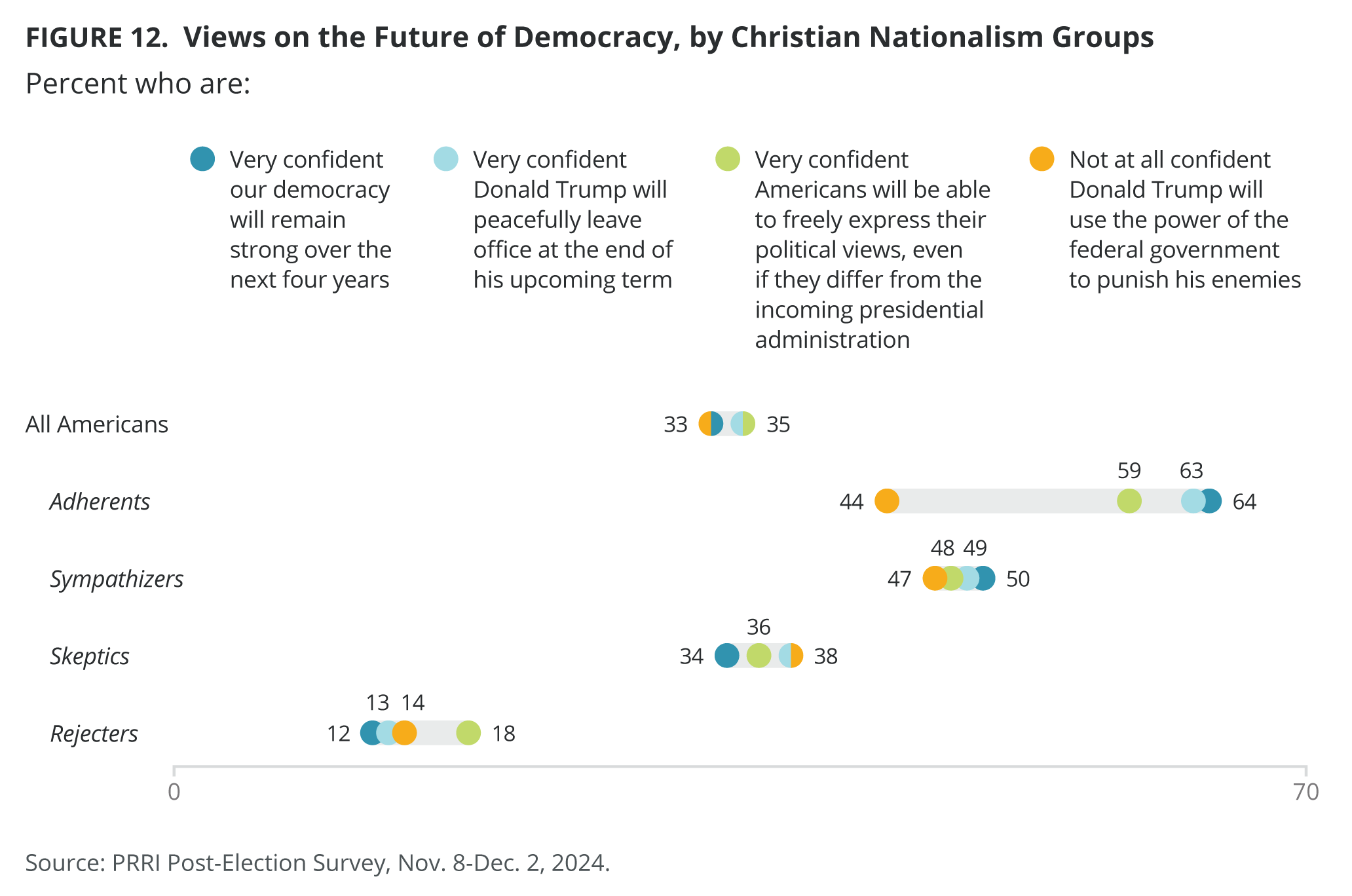
Correlates of Christian Nationalism
To better understand the inner workings of Christian nationalism, we examine four core attitudes often associated with Christian nationalist beliefs: anti-immigrant views, patriarchal understandings of traditional gender roles, political violence, and QAnon beliefs.
Extreme Views Toward Immigrants
Only 36% of Americans agree with the “Great Replacement Theory” — the belief that “immigrants are invading our country and replacing our cultural and ethnic background.” However, support for that belief is much higher among Christian nationalism Adherents (68%) and Sympathizers (62%), compared with just one-third of Skeptics (34%) and fewer than one in ten Rejecters (9%).
Similarly, only 35% of all Americans agree with the statement, “Immigrants entering the country illegally today are poisoning the blood of our country.” Christian nationalism Adherents (69%) and Sympathizers (58%) are significantly more likely than Skeptics (34%) and Rejecters (12%) to agree.
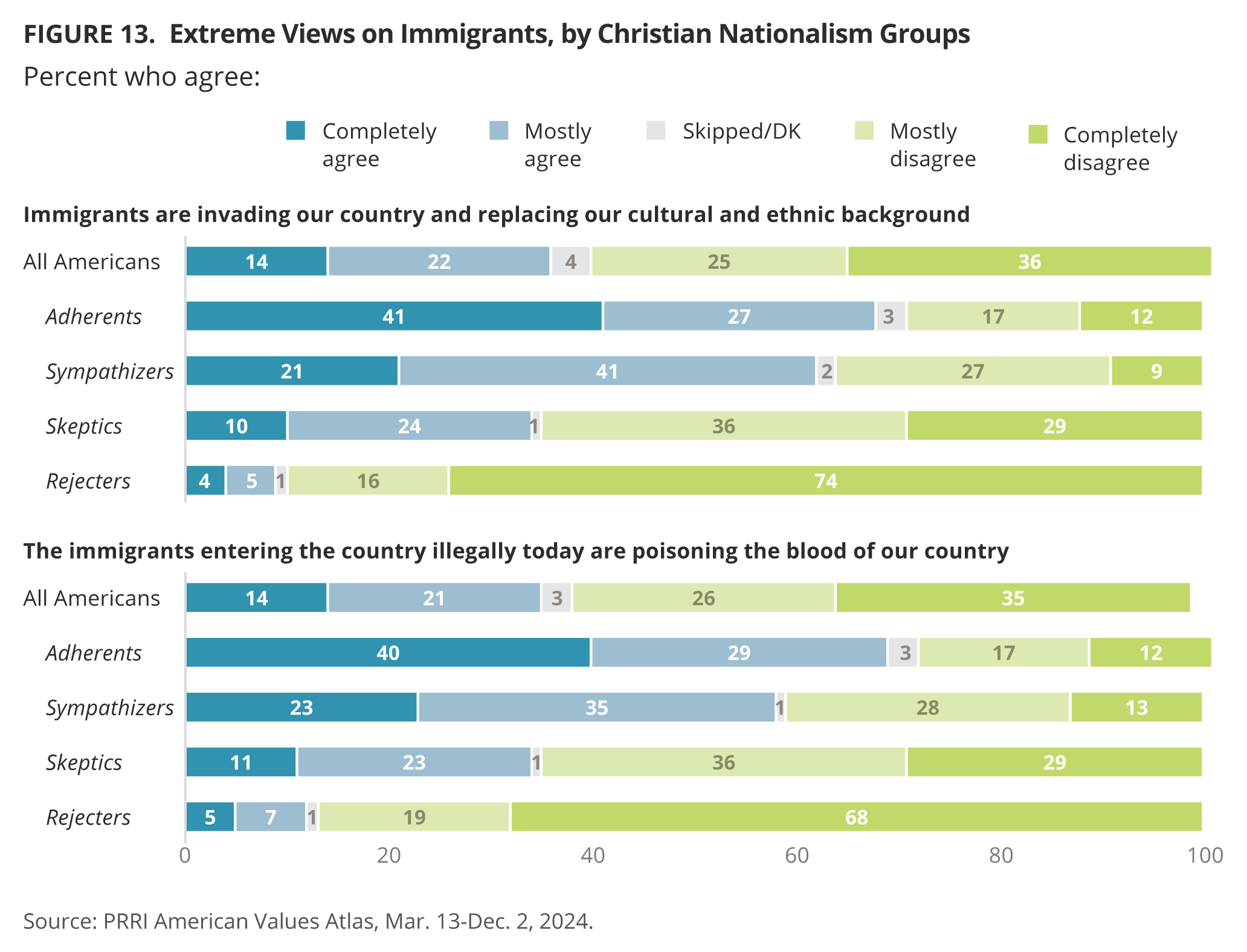
Gender and the Patriarchy
Another key aspect often linked to Christian nationalism is adherence to patriarchal ideals, including beliefs about the role of gender in society. PRRI measures these attitudes by asking respondents whether they agree with the statement “Society as a whole has become too soft and feminine.” While 43% of Americans overall agree with this sentiment, agreement is significantly higher among Christian nationalism Adherents (72%) and Sympathizers (63%), compared with Skeptics (46%) and Rejecters (18%).
Additionally, about one-third of Americans (35%) agree with the statement “Society is better off when men and women stick to the jobs and tasks they are naturally suited for.” Christian nationalism Adherents (61%) and Sympathizers (54%) are more likely than Skeptics (35%) and Rejecters (15%) to agree with this statement.
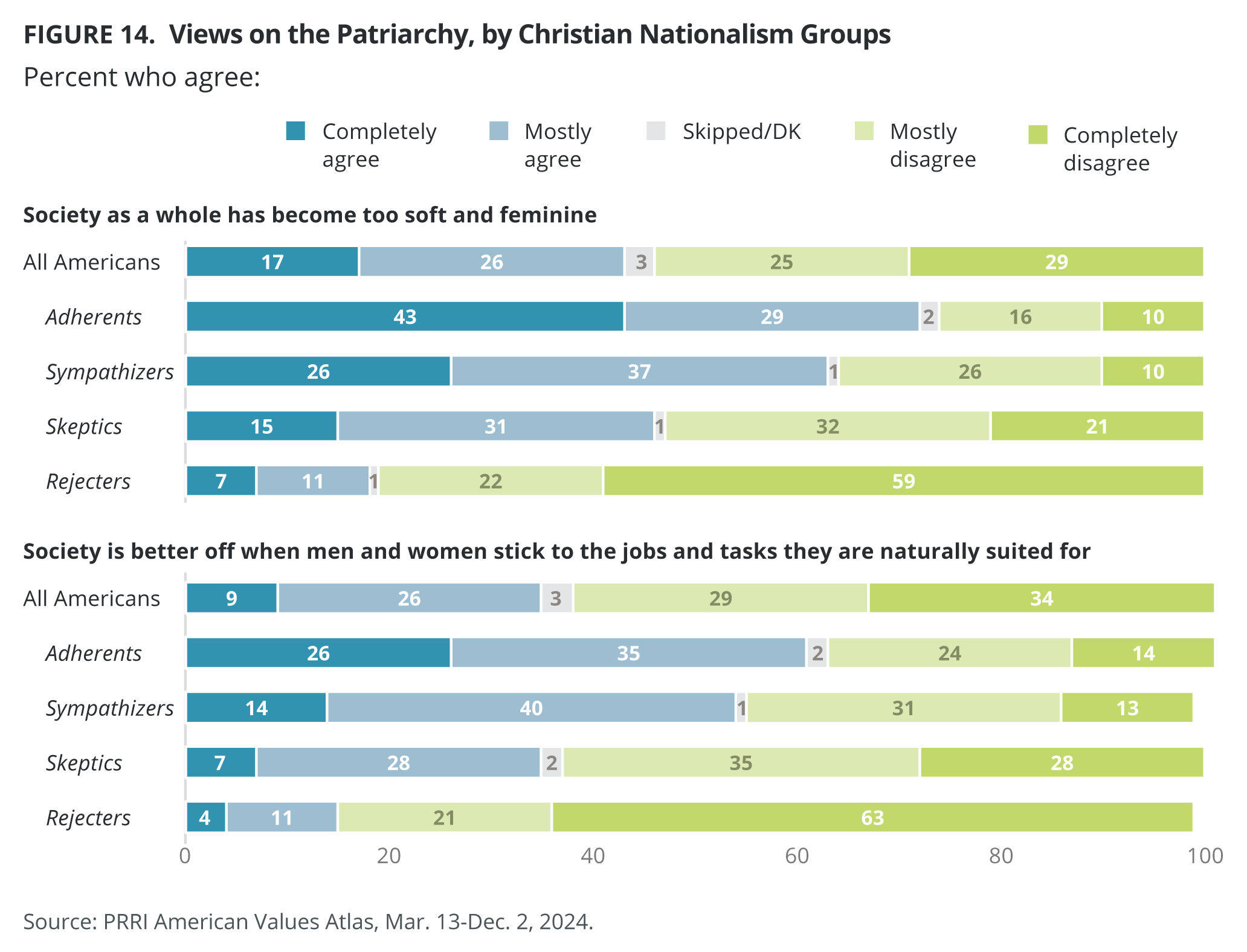
Political Violence and Beliefs in Conspiracy Theories at the State Level
Political Violence
Less than two in ten Americans (17%) agree with the statement “Because things have gotten so far off track, true American patriots may need to resort to violence in order to save our country,” while a strong majority (79%) disagree. However, agreement with political violence is significantly higher among Christian nationalism Adherents (38%) and Sympathizers (28%), compared with Skeptics (15%) and Rejecters (7%), highlighting the strong association between Christian nationalist beliefs and support for political violence.
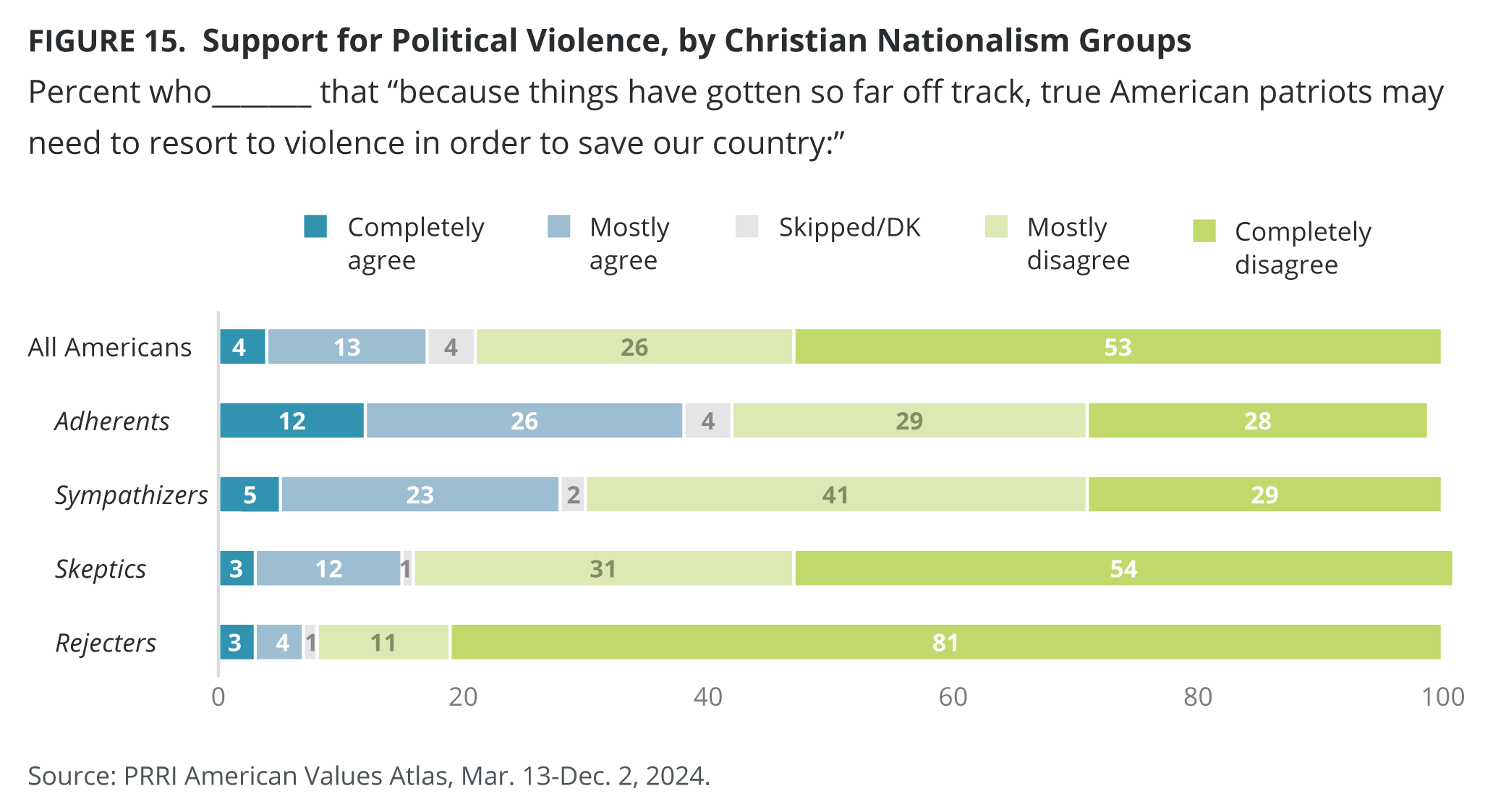
The relationship between Christian nationalist views and support for political violence is also strong at the state level. For instance, in West Virginia, which has an average score of 0.48 on the Christian nationalism scale, 35% of residents agree that political violence may be necessary to save the country. Similarly, in Louisiana, which has an average score of 0.50 on the Christian nationalism scale, 26% of residents say political violence may be necessary. In contrast, states like Massachusetts and Washington, which have significantly lower average scores on the Christian nationalism scale (0.20 and 0.21, respectively), show far less support for political violence, with only 13% of Massachusetts residents and 10% of Washington residents agreeing.
Belief in QAnon Conspiracy Theories
Christian nationalism and QAnon beliefs overlap significantly, as both ideologies often center around themes of conspiracy, mistrust of institutions, and a perceived moral or spiritual battle for the country’s future. Christian nationalism provides a religious framework that emphasizes the idea of America as a divinely chosen nation, while QAnon amplifies this narrative by introducing conspiracy theories that frame political and cultural opponents as existential threats. This convergence has led many individuals to embrace both ideologies as part of a broader worldview rooted in apocalyptic thinking and a desire to restore perceived traditional values.
To measure QAnon beliefs, PRRI has fielded a set of questions since 2021 measuring the extent to which Americans agree or disagree with the following statements: (1) Because things have gotten so far off track, true American patriots may have to resort to violence in order to save our country, (2) There is a storm coming soon that will sweep away the elites in power and restore the rightful leaders, and (3) The government, media, and financial worlds in the U.S. are controlled by a group of Satan-worshipping pedophiles who run a global child sex trafficking operation. [4]
Based on a composite score of these three statements, PRRI finds that nearly two in ten Americans (19%) qualify as QAnon believers, followed by 49% who are QAnon doubters and 32% who are QAnon rejecters. Christian nationalism Adherents (50%) and Sympathizers (32%) are far more likely to qualify as QAnon believers than Skeptics (14%) and Rejecters (6%), underscoring the overlap between both ideologies.
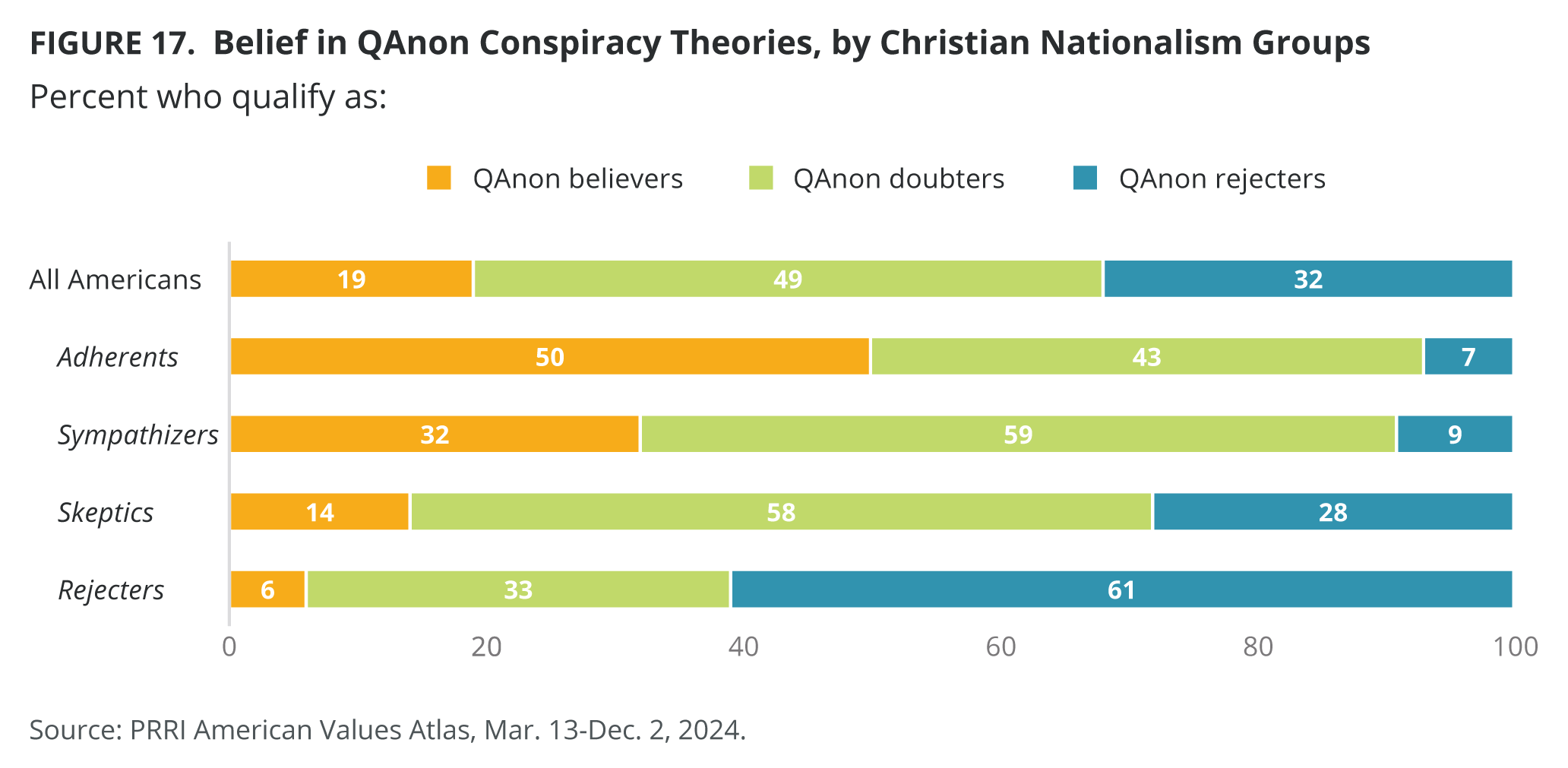
Figure 18 also shows a strong correlation between support for Christian nationalism and QAnon beliefs at the state level. For example, in Louisiana, with an average score of 0.50 on the Christian nationalism scale, 33% of residents believe in QAnon conspiracy theories. Similarly, in Oklahoma and West Virginia, with average scores of 0.49 and 0.48, respectively, on the Christian nationalism scale, both states report 34% of their residents qualifying as QAnon believers. Mississippi also emerges as a state with an average score of 0.50 on the Christian nationalism scale, with 28% of its residents believing in QAnon conspiracy theories. In contrast, Massachusetts and Washington, which have significantly lower average scores on the Christian nationalism scale (0.20 and 0.21, respectively), show far less agreement with QAnon conspiracy theories, with only 13% of Massachusetts residents and 10% of Washington residents qualifying as QAnon believers.
Appendix A. Christian Nationalism Groups Coded by States Where Trump and Harris Won in the 2024 Presidential Election
The following table is sorted in descending order by the proportion of residents in each state who identify as Christian nationalism Adherents or Sympathizers. Additionally, rows are coded red for states where Trump won in the 2024 election and blue where Harris won. The pattern shows a strong correlation between the proportion of Christian nationalism Adherents and Sympathizers in each state and the state’s partisan alignment.
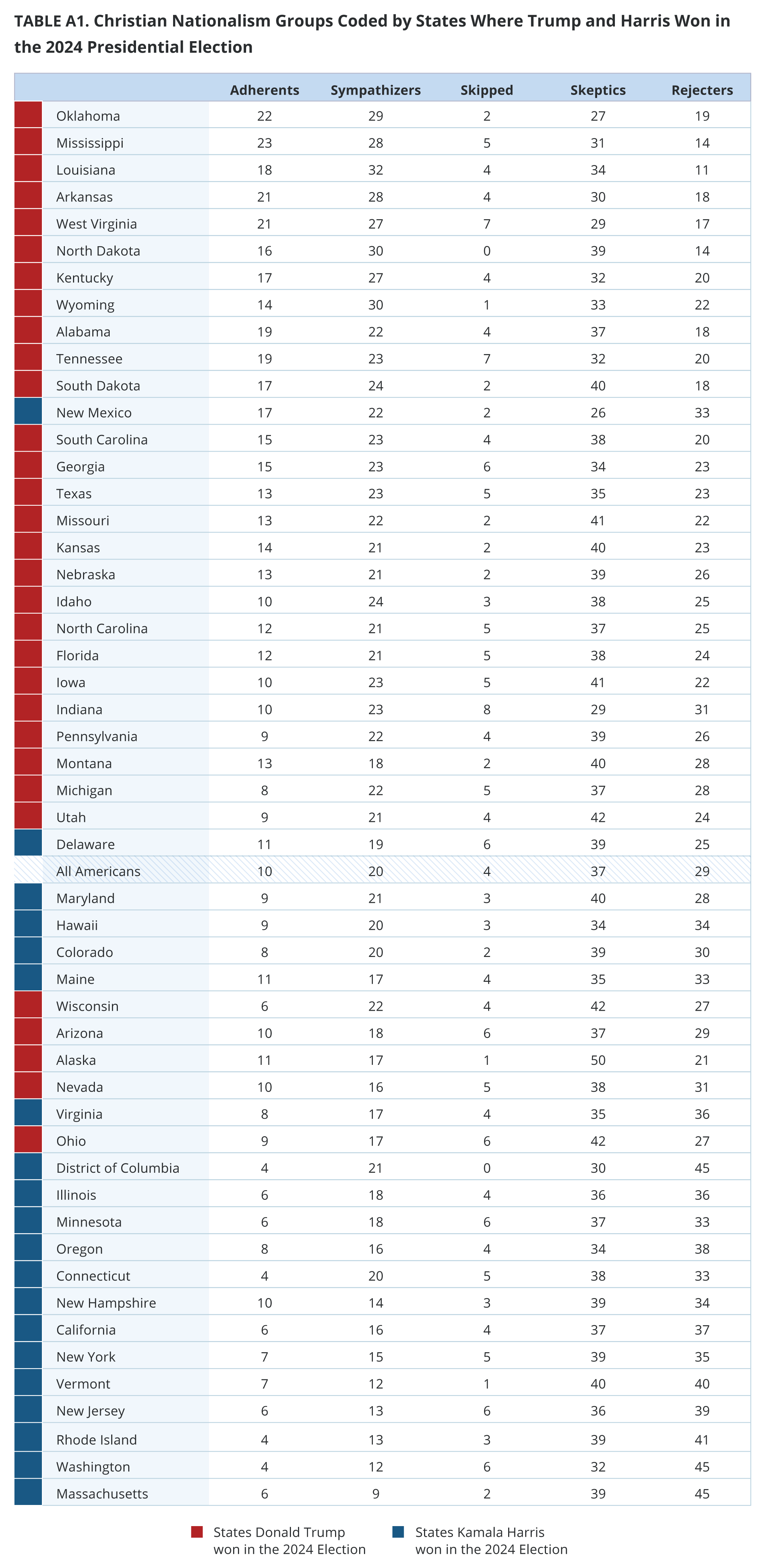
Appendix B. Survey Methodology
The survey was designed and conducted by PRRI. The survey was made possible through the generous support of the Carnegie Corporation of New York, the Foundation to Promote Open Society, the Wilbur & Hilda Glenn Family Foundation, and the Unitarian Universalist Veatch Program at Shelter Rock. The survey was carried out among a random representative sample of 22,260 adults (age 18 and up) living in all 50 states in the United States. Among those, 20,642 are part of Ipsos’s KnowledgePanel and an additional 1,618 were recruited by Ipsos using opt-in survey panels to increase the sample sizes to a minimum of n=150 in smaller states. Interviews were conducted online between March 13 and December 2, 2024.
Respondents are recruited to the KnowledgePanel using an addressed-based sampling methodology from the Delivery Sequence File of the USPS – a database with full coverage of all delivery addresses in the U.S. As such, it covers all households regardless of their phone status, providing a representative online sample. Unlike opt-in panels, households are not permitted to “self-select” into the panel; and are generally limited to how many surveys they can take within a given time period.
The initial sample drawn from the KnowledgePanel was adjusted using pre-stratification weights so that it approximates the adult U.S. population defined by the 2023 March Supplement of the Current Population Survey (CPS), except language proficiency, which is not available from CPS, were obtained from the 2022 American Community Survey (ACS). Next, a probability proportional to size (PPS) sampling scheme was used to select a representative sample.
To reduce the effects of any non-response bias, a post-stratification adjustment was applied based on demographic distributions from the CPS, plus language proficiency from the ACS and party affiliation from Pew’s National Public Opinion Reference Survey (NPORS). The post-stratification weight rebalanced the sample based on the following benchmarks: gender, by age, by race/ethnicity, Census division, metro area by race/ethnicity, education by race/ethnicity, and income by race/ethnicity, language proficiency, party affiliation, and state population size. The sample weighting was accomplished using an iterative proportional fitting (IFP) process that simultaneously balances the distributions of all variables. Weights were trimmed to prevent individual interviews from having too much influence on the final results. In addition to an overall national weight, separate weights were computed for certain states (AZ, CO, FL, GA, MI, NC, NV, PA, TX, and WI) to ensure that the demographic characteristics of the sample closely approximate the demographic characteristics of the target populations. The state-level post-stratification weights rebalanced the sample based on the following benchmarks: age, race and ethnicity, gender, education, and income, language proficiency (FL and TX only), and 2020 presidential vote choice.
These weights from the KnowledgePanel cases were then used as the benchmarks for the additional opt-in sample in a process called “calibration.” This calibration process is used to correct for inherent biases associated with nonprobability opt-in panels. The calibration methodology aims to realign respondents from nonprobability samples with respect to a multidimensional set of measures to improve their representation.
The margin of error for the national survey is +/- 0.84 percentage points at the 95% level of confidence, including the design effect for the survey of 1.6. In addition to sampling error, surveys may also be subject to error or bias due to question wording, context, and order effects. Additional details about the KnowledgePanel can be found on the Ipsos website: ipsos.com/en-us/solution/knowledgepanel
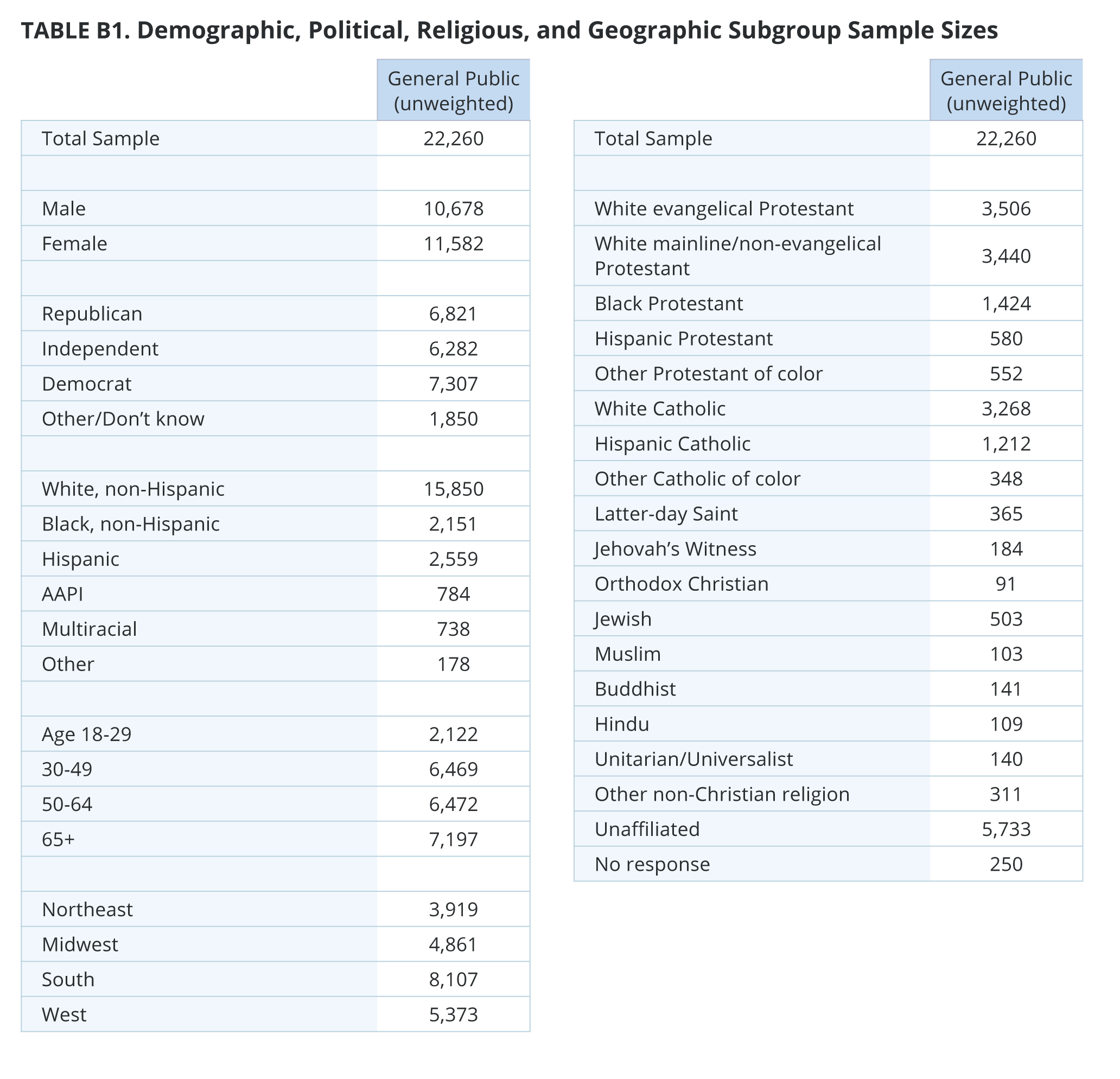
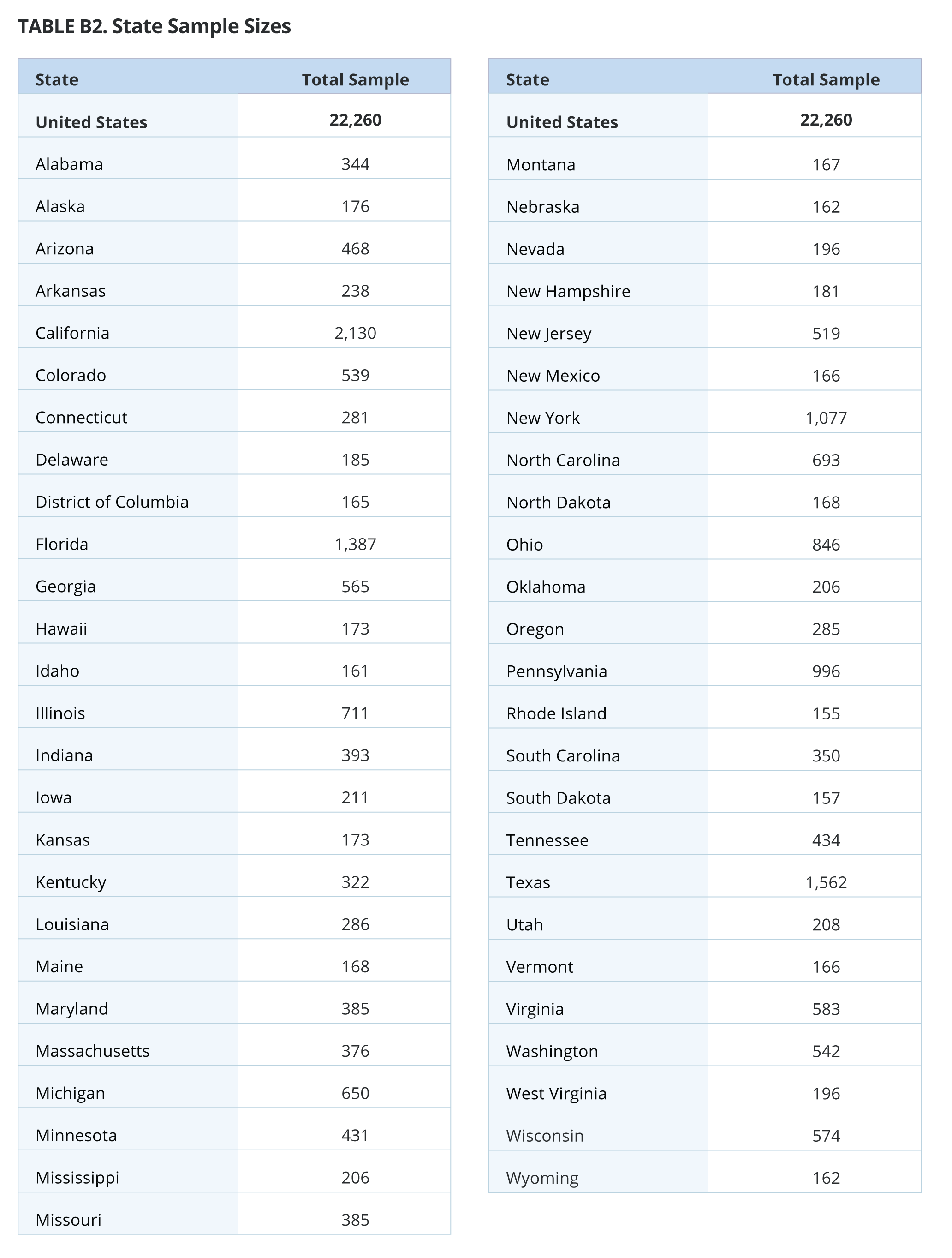
[1] Based on respondents’ answers to (1) The U.S. government should declare America a Christian nation, (2) U.S. laws should be based on Christian values, (3) If the U.S. moves away from our Christian foundations, we will not have a country anymore, (4) Being Christian is an important part of being truly American, (5) God has called Christians to exercise dominion over all areas of American society, each respondent receives a composite score on the Christian nationalism scale (with a range of 0 to 1) and is then assigned to one of the four groups. For more information about how measures are constructed, please see both of our previous reports: A Christian Nation? Understanding the Threat of Christian Nationalism to American Democracy and Culture and Support for Christian Nationalism in All 50 States: Findings from PRRI’s 2023 American Values Atlas.
[2] For a more thorough analysis of the relationship between race, ethnicity and support for Christian nationalism, see PRRI. “Support for Christian Nationalism in All 50 States: Findings from PRRI’s 2023 American Values Atlas.” Feb. 28, 2024.
[3] 2024 voter data was retrieved from AP VoteCast Election 2024. See, apnews.com/projects/election-results-2024/
[4] For more information on our QAnon measures and analysis, see: The Rise and Impact of Q: The 2024 Election from the View of QAnon Believers


